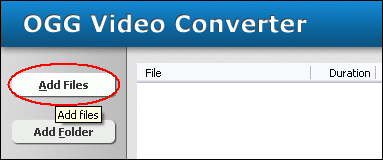MTV to OGGConvert MTV to OGG, MTV to OGG Converter |
 |
| Home | Getting Started | Download | Buy Now! | Screen Shots | FAQ | Support | Contact |
OGG Video Converter converts MTV files to OGG format easily and quickly. The software is an ALL-IN-ONE audio converter that supports more than 100 audio and video files. OGG Video Converter supports batch conversion, and is full compatible with 32-bit and 64-bit Vista and Windows 7.
 Click "Add Files" to choose MTV files and add to conversion list.  Choose one or more MTV files you want to convert and then click "Open". OGG Video Converter will open the files and get information such as width, height, frame rate, video bit rate, audio sample rate, audio bit rate, audio channels, and then list the information at conversion list. 

 Click "Convert" to convert MTV files to OGG format.  The software is converting MTV files to OGG format.  Right-click converted WMA file and choose "Play Destination" to play the outputted WMA file; choose "Browse Destination Folder" to open Windows Explorer to browse the WMA file. What is MTV? The format operates by displaying a series of raw uncompressed rgb565/555 image frames while playing MP3 audio but as the files are of low resolution and frame rate, sizes are comparable to MPEG-1 or MPEG-2. (in a bytes-per-minute sense). Encoding and decoding are less processor-intensive than other contemporary formats, as in fact very little "encoding" is actually done. The MTV format consists of a 512 byte file header, followed by alternating audio and image blocks. Audio frame data is not necessarily aligned on block boundaries and each one of them has from 1 to n subblocks of 512 bytes each with 'n' remaining constant through the entire file/stream. The first 12 bytes of each audio subblock is padding data and is always set to 0. Image data, on the other hand, is perfectly contained in each image data block, each one representing an entire frame. During decoding of the video stream, the audio frames are passed to the MP3
hardware decoder, while the memory pointer of the display hardware is simply adjusted
to the next raw image within the video stream. While this concept does not require
additional * hardware for the decoding process, it leads to huge memory requirements
as no compression is applied to the image frame data. What is OGG? The name "Ogg" refers to the file format which can multiplex a number of separate independent free and open source codecs for audio, video, text (such as subtitles), and metadata. In the Ogg multimedia framework, Theora provides a lossy video layer, while the music-oriented Vorbis codec most commonly acts as the audio layer. The human speech compression codec Speex, lossless audio compression codec FLAC, and OggPCM may also act as audio layers. The term "Ogg" is commonly used to refer to audio file format Ogg Vorbis, that is, Vorbis-encoded audio in the Ogg container. Previously, the .ogg file extension was used for any content distributed within Ogg, but as of 2007, the Xiph.Org Foundation requests that .ogg be used only for Vorbis due to backward compatibility concerns. The Xiph.Org Foundation decided to create a new set of file extensions and media types to describe different types of content such as .oga for audio only files, .ogv for video with or without sound (including Theora), and .ogx for applications. Because the format is free, and its reference implementation is non-copylefted, Ogg's various codecs have been incorporated into a number of different free and proprietary media players, both commercial and non-commercial, as well as portable media players and GPS receivers from different manufacturers. Convert MTV to OGG Related Topics: H264 to OGG, SWF to OGG, VQF to OGG, MVI to OGG, OGM to OGG, DV to OGG, SOL to OGG, HDTV to OGG, DNXHD to OGG, VID to OGG, M2T to OGG, MTV to OGG, AMV to OGG, VOC to OGG, MPE to OGG, CAF to OGG, W64 to OGG, MJ2 to OGG, WM to OGG, AVI to OGG, M4R to OGG, MP1 to OGG, ADTS to OGG, NUT to OGG, XVID to OGG, MLP to OGG, VOB to OGG, DIVX to OGG, SDP to OGG, VFW to OGG
|
| Home | Getting Started | Download | Buy Now! | Screen Shots | FAQ | Support | Contact | Links |
| Copyright © 2007-2014 Hoo Technologies All rights reserved. Privacy Policy |